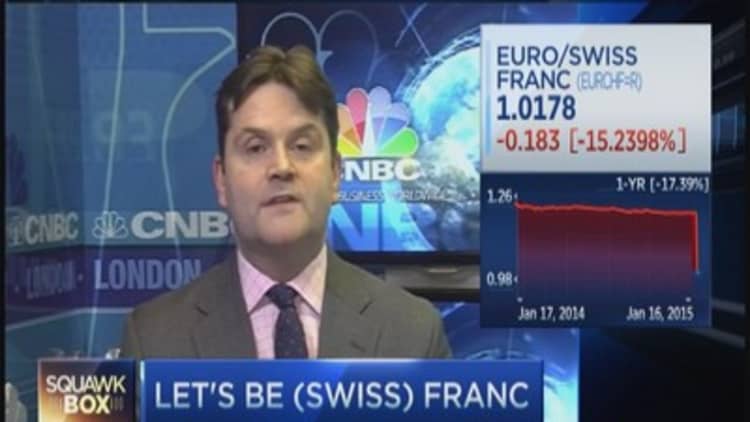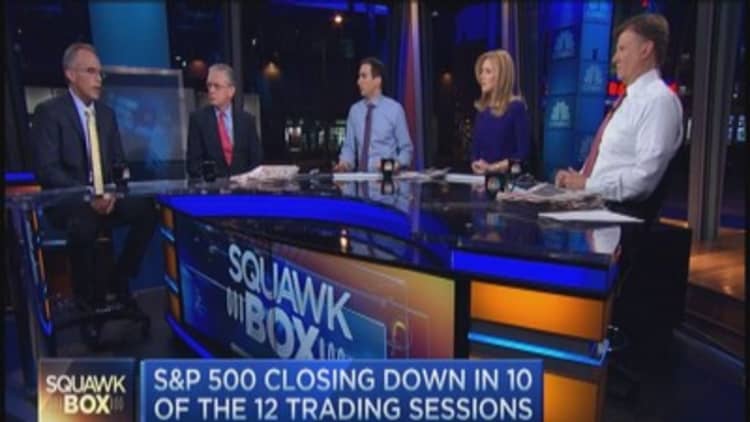
A surprise change in monetary policy by the Swiss National Bank has upped the ante for the European Central Bank ahead of a meeting next week, during which it is expected to announce new stimulus measures, Jeremy Stretch, head of FX strategy at CIBC, told CNBC.
"If the ECB does not step up to market expectations, then I think we would see further degrees of elevated volatility, and hence the reason that investors have been seeking the safety of bonds," he said in a "Squawk Box" interview on Friday. "The question is will the ECB disappoint or will they provide enough liquidity to the system to at least assuage investors?"
On Thursday, Switzerland's central bank ended its policy of capping the at 1.20 to the euro, sending the currency soaring nearly 30 percent and roiling markets around the world.
Read MoreUS bonds gain, Swiss yields turn negative on SNB
While Europe's peripheral economies have been under pressure for some time, the euro has cheapened considerably already from highs seen in early 2014, Stretch said. Over time, that will provide some loosening of monetary conditions, he added, but ultimately that loosening must accelerate.
"That's the reason why the euro effectively continues to be talked down by the ECB, and that's why the policy of expanding its balance sheet is effectively aimed at boosting economic conditions," he said.
Switzerland's decision in 2011 to peg its currency to the euro essentially absolved the Swiss of setting their own monetary policy, but that line became increasing untenable in recent weeks, he said. The consequence has been an extreme value loss for the Swiss, adding up to roughly double the profit the SNB made last year, he said.
One could argue the current valuation of the Swiss franc is more realistic in view of its huge current account surplus of 10 to 12 percent of GDP, Stretch said.
Read MoreForex broker Alpari UK enters insolvency after SNB shock
The impact on the euro zone will be a net benefit, he added, as a cheapening of the euro will help Europe's periphery and further boost Germany, which has continued to drive growth in the currency union. "Without that motor of growth, the euro zone looks much sicker, and I think that would be much more damaging for the global economy, which of course, the euro zone is still an integral part."
Discussions of the U.S. dollar and euro reaching parity are likely pre-emptive, but the euro could fall back to lows of $1.10 or $1.12 against the dollar, he said.

Not only will the dollar get stronger, but bond yields will continue to go lower, David Joy, chief market strategist at Ameriprise Financial told "Squawk Box." He noted that it looks increasingly likely that the ECB's expected quantitative easing program will be sizable, which would drive down interest rates and could have a spillover effect on U.S. yields.
The has fallen 37 percent to 2.37 percent over the last year.
Falling bond yields represent "the fear trade that is really a consequence of what we like to call the great and final global unwind," Brian Belski, chief investment strategist at BMO Capital Markets, told "Squawk Box." Investors are finally giving up and admitting that growth is not going to come from emerging markets or Europe, but the United States, he said.
Read More 7 ways to play the drama overseas
The global growth picture could put the Federal Reserve's anticipated decision to raise interest rates on hold, Joy said. In the most recent minutes from the Federal Open Market Committee, members noted that they are concerned that the situation abroad poses a risk to the U.S. economy.
The decision will ultimately come down to wages, Belski said. The Fed will pull the trigger only when corporate America has an impetus to change its behavior, and that will not happen if global growth is slowing, he said.
"We remain in a very reactive marketplace and the behavior has to change to allow corporate America to feel better about holistically what's happening with their businesses," he said. "If things continue to slow, they're not going to hire, and if they're not going to hire, wages aren't going to go up. And if wages aren't going to go up, the Fed is going to be on hold longer than people think."


